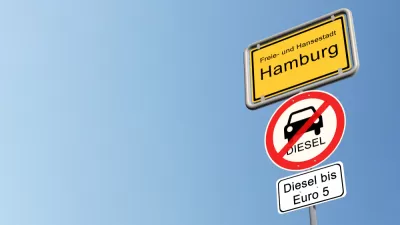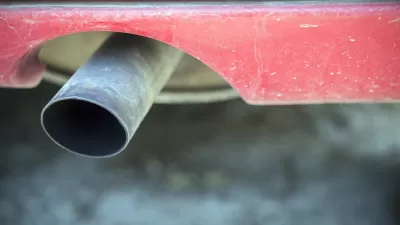Germany's automotive industry and Chancellor Angela Merkel are increasingly worried about the economic effects of court-sanctioned diesel driving bans to improve air quality, as enacted in Hamburg last May. Four more cities are likely to enact bans.

Germans are serious about mitigating air pollution, especially nitrogen oxides and particulate matter, by-products of diesel combustion. Hamburg was the first German city to enact a driving ban for all but the newest diesel cars in parts of the city on May 31. Düsseldorf and Stuttgart, Aachen, and Frankfort are not far behind.
A landmark ruling by the Constitutional Court last February, stemming in part from the diesel emissions cheating scandal first discovered in the U.S. in September 2015, enabled cities to prohibit the operation of diesel cars to protect public health. As posted March 2:
The court further found that when emissions exceeded the allowed limits, banning all vehicles with diesel motors older than those approved in 2014 and gasoline-burning engines older than those approved in 2001 was the only way for the municipal authorities to ensure air quality.
"From May 31, the city of Hamburg is banning all but the most modern 'Euro 6' diesel vehicles from sections of two busy streets in the city," reported Arthur Sullivan for DW. According to Auto Express UK:
Euro 6 is the sixth incarnation of the European Union directive to reduce harmful pollutants from vehicle exhausts. The Euro 6 standard was introduced in September 2015, and all mass-produced cars sold from this date need to meet these emissions requirements. The aim of Euro 6 is to reduce levels of harmful car and van exhaust emissions, both in petrol and diesel cars.
"With cities like Stuttgart and Frankfurt poised to impose driving bans because of excessive levels of smog-causing nitrogen oxides, Chancellor Angela Merkel’s government is under increasing pressure to come up with a solution," reports Birgit Jennen on Sept. 27 for Bloomberg News.
“The quick and overall better way is to replace the old fleet with a new one,” Merkel said late Thursday at a town-hall event in Augsburg, Germany. “In addition, the door can be opened for retrofits on some vehicles...and we believe the customer shouldn’t have to pay for it.”
Indeed, to a great extent, that's how Dieselgate is being handled in the U.S. But due to the advocacy of Deutsche Umwelthilfe (DUH, known in English as Environmental Action Germany), driving bans, as opposed to huge financial settlements, are also permitted.
The manufacturers [Volkswagen AG, BMW AG and Daimler AG] are keen to avert driving bans as the incessant debate is causing consumers to shy away from diesel technology, which is profitable, secures German jobs and helps meet tighter environmental regulations. [Italics added].
Stuttgart and Aachen are next, followed by Frankfurt
"The ban will come into effect on January 1 in the hometown of carmakers Mercedes-Benz, Porsche and Audi," according to a DW report on July 11. Like the Hamburg ban, it will only be enacted in specific areas suffering bad air quality.
Overall the Stuttgart region has around 530,000 diesel vehicles. The new regulation will affect an estimated 190,000 vehicles that only meet the emission standard Euro 4 [2005 to September 2009].
The Autovista Group reported on June 12 that "[t]he German city of Aachen is likely to become the second in the country to introduce a ban on Euro 5 [purchased before September 2015] and lower diesel vehicles entering parts of the city."
The regional court has ruled that authorities in the area must implement a diesel ban in the city by January 2019 to allow the city to comply with EU air quality rules.
DW reported on a Sept. 5 court ruling in response to a second lawsuit brought by Deutsche Umwelthilfe that will require Frankfurt to "ban high polluting diesel vehicles from parts of the city."
FULL STORY: Germany Grapples to Find Exit From Diesel-Emissions Crisis

Planetizen Federal Action Tracker
A weekly monitor of how Trump’s orders and actions are impacting planners and planning in America.

Chicago’s Ghost Rails
Just beneath the surface of the modern city lie the remnants of its expansive early 20th-century streetcar system.

San Antonio and Austin are Fusing Into one Massive Megaregion
The region spanning the two central Texas cities is growing fast, posing challenges for local infrastructure and water supplies.

Since Zion's Shuttles Went Electric “The Smog is Gone”
Visitors to Zion National Park can enjoy the canyon via the nation’s first fully electric park shuttle system.

Trump Distributing DOT Safety Funds at 1/10 Rate of Biden
Funds for Safe Streets and other transportation safety and equity programs are being held up by administrative reviews and conflicts with the Trump administration’s priorities.

German Cities Subsidize Taxis for Women Amid Wave of Violence
Free or low-cost taxi rides can help women navigate cities more safely, but critics say the programs don't address the root causes of violence against women.
Urban Design for Planners 1: Software Tools
This six-course series explores essential urban design concepts using open source software and equips planners with the tools they need to participate fully in the urban design process.
Planning for Universal Design
Learn the tools for implementing Universal Design in planning regulations.
planning NEXT
Appalachian Highlands Housing Partners
Mpact (founded as Rail~Volution)
City of Camden Redevelopment Agency
City of Astoria
City of Portland
City of Laramie





























